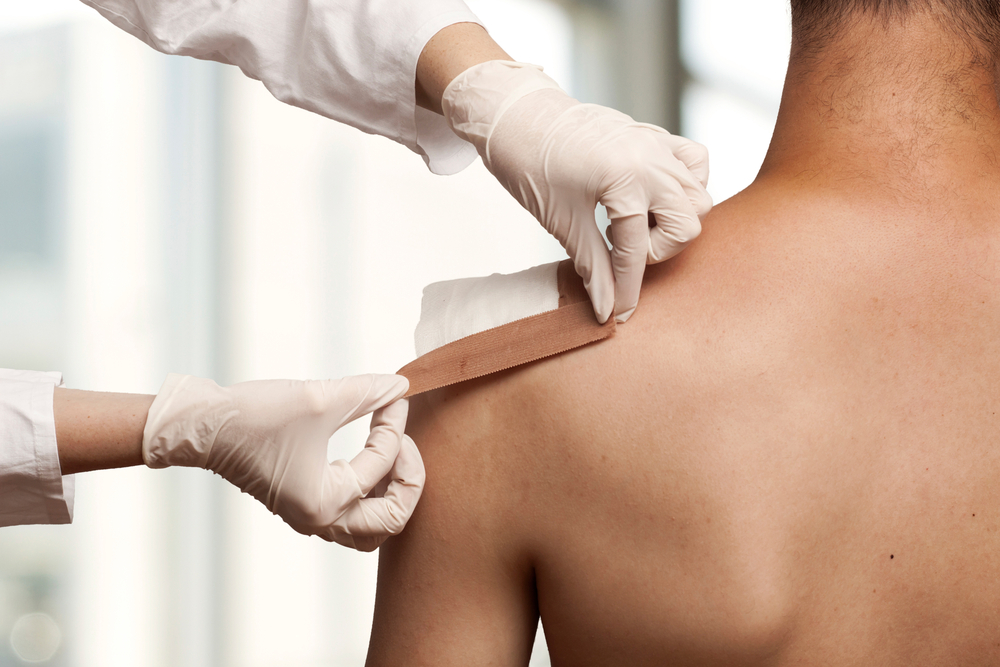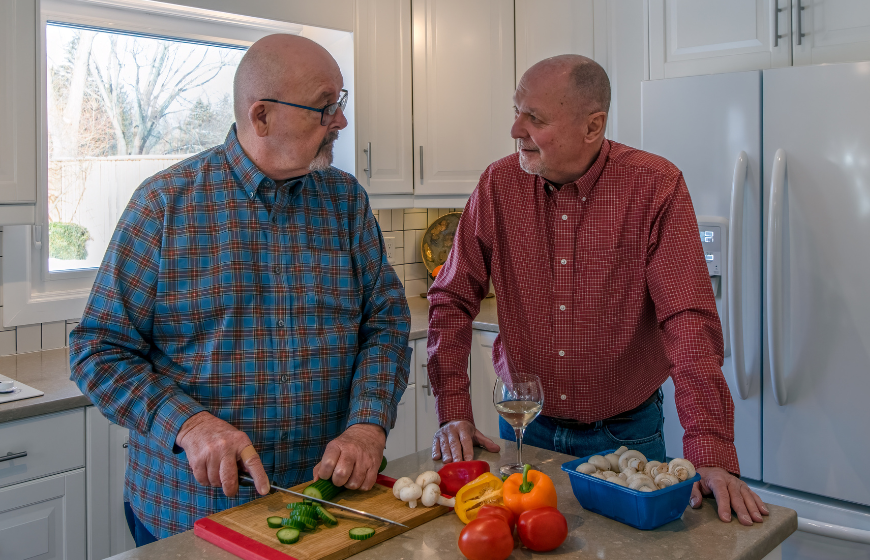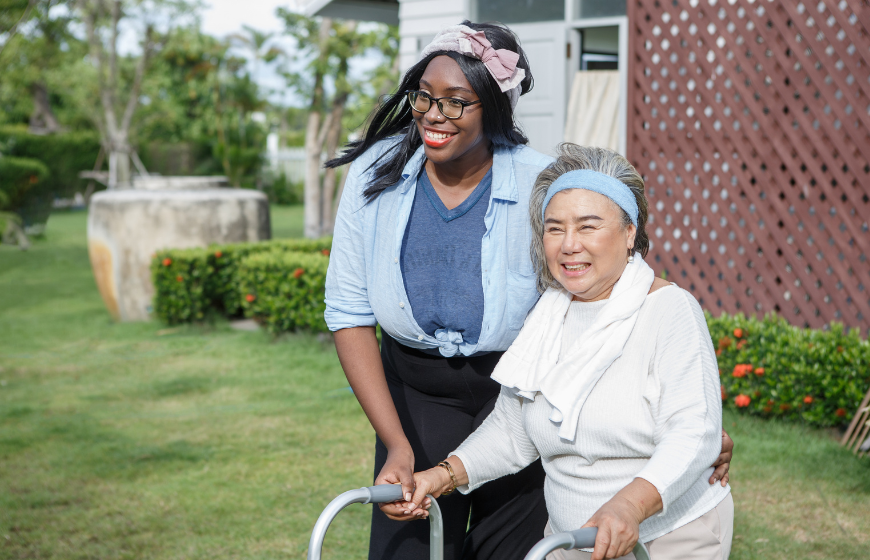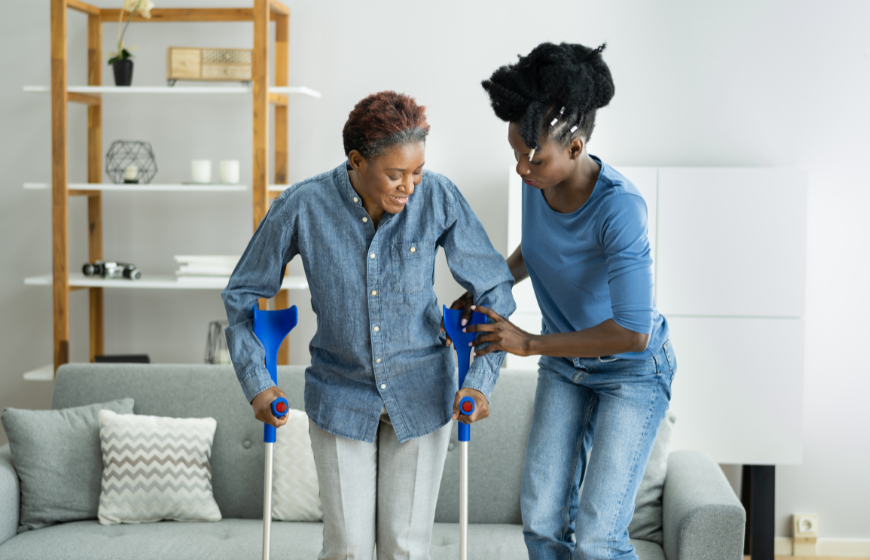An open wound can occur for any number of reasons—from a fall as you’re walking your dog down the street to a laceration from a surgical procedure. Moreover, as the body ages, wounds and injuries become more frequent.
Wound care can be complicated and requires regular attention. While there is no replacement for professional help and nursing support, this article offers the do’s and don’ts of wound care at home.
The Do’s of At-Home Wound Care
There are a various considerations to take when caring for a wound at home, such as inspecting, diagnosing, dressing, and bandaging.1 However, in most cases, it is best to leave wound care to a professional. If you’re not looking to acquire professional help, there are a few things to keep in mind when caring for a wound at home.
Do Know the Essentials of Wound Cleaning
Whether it’s a papercut or a more serious injury, do make sure that you know the essentials of wound cleaning:
- Wash your hands – Before dealing with a wound, make sure your hands are clean. Wash your hands for at least twenty seconds with soap and warm water before beginning. This will ensure you don’t introduce any additional dirt, germs, or other harmful material to the damaged area.
- Stop the bleeding – Smaller wounds, such as cuts, scratches, and scrapes, will usually stop bleeding on their own. However, for more severe abrasions, you will want to keep the site of the wound elevated while gently applying pressure to the area with a clean, non-irritating cloth.
- Rinse the wound – Run clean water over the wound site, ensuring that it is free of dirt, germs, and foreign matter. Use warm water, as hot water can dry out the skin and lead to irritation and cause the affected area to be broken easily.
- Gently wash the wound – Use a soft, clean cloth to form a lather with a mild soap. If the area is susceptible, you can skip the soap entirely. Lightly scrub the wound, then rinse the soap from the wound bed. Be sure to pat the area dry before continuing.
- Dress the wound – To prevent scabbing and provide a protective layer, dress the wound with an ointment. Moisturizing the area will also help to keep scarring to a minimum.2 You can use one of the following for wound dressing:
- Antimicrobial gel
- Petroleum jelly
- Hydrocolloid
- Foam dressing
- Bandage the wound – Bandaging the wound is essential for preventing infection and keeping it from being damaged further, which may lead to bleeding. Try using a bandage that has an adhesive. However, in some cases the skin might be too sensitive for adhesive. In this case, you can strap gauze around the area and secure it with paper tape.
Do Clean the Wound Daily
Daily cleaning is necessary when it comes to caring for a wound. Check it daily to see how the wound is healing and ensure that it is clean and well-moisturized. If you notice that the wound is showing signs of infection, consult a medical professional.

Do Compress the Wound Area
According to the Mayo Clinic, plenty of evidence that shows that compression can help wounds heal more quickly.3 That’s because compression reduces edema—swelling caused by excess fluids by evenly distributing fluid in the tissue rather than letting it build in one place.
Here are some popular options for compression that you might consider keeping around the house in the case of a wound:
- Compression sleeves
- Wraps and bandages
- Stockings
Do Protect the Wound From the Sun
When your skin is healing, it’s not at its strongest. As such, the wound site will need some extra protection from the elements, including the sun.
Even if your wound is healing quickly and appears to be much better, it may be beneficial to apply sunscreen to the wound site to protect your healing skin from any damaging rays.
Do Consider Getting Professional Medical Support from a Home Nurse
It can be overwhelming to take care of a wound by yourself or for a loved one. At-home nurses are trained to handle wounds and can keep a watchful eye over your or your loved one’s physical health so you can focus on recovery. With an at-home nurse, you can rest assured that you’re getting the care you deserve.
The Don’ts of At-Home Wound Care
When it comes to wound care, knowing what not to do is important to prevent further damage and infection.
Don’t Use Your Bare Hands
Hygiene is key when treating any wound. Take precautions by thoroughly washing your hands and wearing a pair of non-powdered vinyl or nitrile gloves before touching the wound.4
Don’t Cause Friction and Irritation
When treating your wound, try to avoid adding friction to the damaged area. If possible, use powdered sheets on the affected area to prevent your wound from shearing. Wound shearing occurs when downward pressure combines with friction and may lead to cell death. As such, avoid rubbing or massaging the wound site.
You’ll also want to be careful when stretching. While this can increase blood flow throughout your body, it can also worsen the wound and cause it to bleed.
Don’t Take a Bath or Soak the Wound
When you have a wound, taking a shower is preferable to taking a bath. You don’t want the wound to soak in water, as this can delay recovery. If a bath is the only option, try keeping the wound out of the water or limiting bath time.5
Don’t Bother with an Antibiotic
Thorough, gentle lathering of the wound site is enough to prepare it to be dressed and bandaged. There’s no need to apply antibiotic ointment. In fact, some studies suggest that this could slow the healing process.
Don’t Forget to Check-in Daily
Sometimes it’s easy to bandage a wound and forget to follow up. With aging skin, healing a wound takes longer. Check-in daily to ensure everything is clean and appropriately dressed for fast healing.
Different Types of Wounds
There are several ways that a wound can form on the body. The most common types of wounds that afflict seniors include:
- Surgical wound – One of the most common causes for a wound is surgery. As the body ages, people are more likely to need surgery. However, the aging body typically does not heal quickly, and some extra care and attention may be necessary.
- Pressure ulcers – This type of ulcer is also commonly known as bedsore. Pressure ulcers occur when pressure has been applied to the skin for an extended period of time. This is often the result of immobility or sitting and lying in the same place over a long period of time without adjustment. As these types of sores can be life-threatening, it’s important to know how to identify and treat pressure ulcers.
- Skin abrasions – As the body ages, the skin cannot divide cells and reproduce as quickly as it once could. As a result, the skin is thinner, making it more susceptible to tearing, especially when experiencing any type of friction.
Be careful to avoid unnecessary friction when moving or shifting from a seat or vehicle. Also, try to dress the abrasions in clothing that is loose-fitting.
- Foot circulation and ulcers – Especially common amongst seniors with diabetes, foot problems such as ulcers and blisters can occur when there is insufficient circulation for the feet. The culprit is often a shoe that restricts blood flow. However, diabetes patients are not always able to feel pain or discomfort in their feet, making this a difficult issue to detect. An at-home nurse can help identify these ulcers during routine checks.
- Venous stasis ulcers – Lack of movement, diabetes, and hypertension—each of these conditions can contribute to venous ulcers in seniors. When blood flow is less than ideal, it can cause pressure and damage to small blood vessels. The result is skin that can break more easily. Something as minor as a scratch or a bump can form an ulcer. According to a report from the Mayo Clinic, venous ulcers are the most common type of wound that affects seniors,. Most often, they’re caused by obesity or recent surgery.6
How to Prevent Wounds from Occurring
While wounds are to be expected as the body ages, certain preventative measures that can prevent wounds from occurring:
- Get enough movement – Whether you’re in a wheelchair or bed for a long period of the day, it is important to get the blood flowing. Try to change positions as often as every fifteen minutes throughout the day. This will minimize the blood pressure on the skin and help to prevent bedsores from forming.
- Provide support and elevation – Elevating your head above the rest of your body helps to prevent shearing. If you are often lying in bed, keep the head of the bed elevated if possible.
- Improve circulation – Edema is the main cause of venous ulceration. There is robust evidence showing that compression can aid in the reduction of edema, thus leading to less venous ulceration. Use sleeves and wraps to encourage circulation in your arms and legs.
- Avoid rubbing and scratching – Friction of any sort presents a potential problem for aging skin, such as shearing or tearing.
- Keep skin moisturized – When skin becomes dry, it can become irritated and itchy. Keeping your skin healthy and happy is important when preventing shearing and friction.
Proper skin and wound mitigation treatments can help to prevent and treat chronic wounds. Particularly in senior citizens, it’s important to address any medical issues before the problem has the opportunity to grow worse.
Let Alliance Homecare Help You
Wound care is a complex process that requires knowledge and expertise and most often requires professional assistance. Care for your wound the right way with Alliance Homecare.
We offer at-home wound care services that provide patients with basic wound care, self-care training, and cutting-edge treatments such as Vacuum Assisted Closure (VAC) for complex wounds.
With Alliance Homecare, you can rest assured that you’re on the fastest road to recovery.
Sources:
- SEALSKIN Medical Wrap. The Do’s And Don’ts of Wound Care at Home. https://sealskinwrap.com/blog/wound-care-at-home/
- AAD. Proper wound care: how to minimize a scar. https://www.aad.org/public/everyday-care/injured-skin/burns/wound-care-minimize-scars#.
- Mayo Clinic. Mayo Clinic preclinical discovery triggers wound healing, skin regeneration. https://newsnetwork.mayoclinic.org/discussion/mayo-clinic-preclinical-discovery-triggers-wound-healing-skin-regeneration/
- Real First Aid. Gloves. https://www.realfirstaid.co.uk/gloves.
- NHS. Caring for Your Wound at Home. https://www.lhch.nhs.uk/media/1112/wound-care-discharge-advice-march-15.pdf
- NHS. Causes-Venous leg ulcer. https://www.nhs.uk/conditions/leg-ulcer/causes/
- The Mayo Clinic. Prevention, Diagnosis, and Management of Chronic Wounds in Older Adults. https://www.mayoclinicproceedings.org/article/S0025-6196(19)30886-9/fulltext




